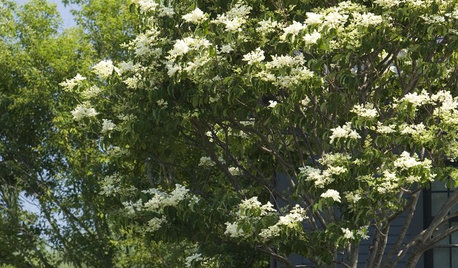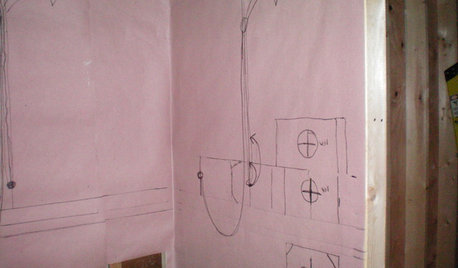Questions about urine in compost
PianoFury
11 years ago
Featured Answer
Sort by:Oldest
Comments (46)
Laurel Zito
11 years agolast modified: 9 years agoceth_k
11 years agolast modified: 9 years agoRelated Discussions
Question about 'blender' composting
Comments (70)Manual ways of reducing melon rinds and such involve a heavy knife, or, if you want to take out your aggression on the fruit, a machete. My mother had a manual meat grinder when I was a kid, and I've seen vegetable slicers of the same sort. If one of those can reduce carrots to slivers, it would do the same for melon rinds. Paper can be hand-shredded or you can use a paper cutter to cut it into strips and then cut the strips crosswise. Either way, it's a lot of work, and I don't know if most people are willing to put that much effort into it. Generally, if something requires a little personal effort and a little electricity, it's more likely to get done than if it requires a lot of manual effort and time and no electricity. If that were not the case, "labor-saving" electrical devices would never have become popular. To be completely honest, I do have a powerful blender with a container dedicated to compost. I tend to use it when I'm cleaning out the fridge and getting rid of all the leftovers that are growing green fuzzy things. I'll usually wind up with a bucket full of nasty slurry, which then gets dumped into the compost pile and covered with shredded leaves or wood chips. My blender can handle meat and bones as well as veggies, enabling me to compost things that are usually on the "do not compost" list by breaking them down into tiny particles which rot quickly before attracting flies. Most of the time, however, I just dump things into the compost without shredding. I think that the energy used in shredding is offset by the energy used in manufacturing a black plastic bag, using a big smoke-belching diesel truck to take the bag to the landfill (or the incinerator), and then using a big smoke-belching diesel bulldozer to bury the bag in the landfill (or using more fuel to burn it); either way the organic material will be lost to the ecosystem., and in the case of the incinerator, which is where my trash would go, the carbon is emitted as CO2. IMO, it's much better to have it in the garden nurturing the roses, no matter how it got there....See MoreHuman Urine in Composting
Comments (8)If you turn the pile (once a week or so)- With that much material (16+ yards), IMHO you will not overdo it adding 1 gallon per day. There will be a point that you will want to finish the compost by letting the pile sit for a month or preferably longer - I do this when the freshly turned pile looks like dark shredded mulch - stop and start a new pile. If you do not turn the pile- I would make the pile, apply what you have at the time, and pretty much let it be - maybe a sprinkling now and then. The link below discusses the NPK of urine used as fertilizer. Best of Luck! Here is a link that might be useful: http://forums2.gardenweb.com/forums/load/cornucop/msg0404052211211.html...See MoreCat Urine in Compost?
Comments (19)I have a cat that used to spray. It started when I was packing some stuff up in the family room and brought some used boxes into the house. I think one of the boxes had the scent of another cat somehow and she felt territorial and started spraying the box. The pee was getting on the carpet and coffee table too! Finally I figured out what was going on, removed the boxes, and cleaned everything using a Cat Spray from the pet store. Also did things like set up an extra box for her, used "Cat Attract" litter, etc. and thankfully the peeing outside the litter boxes has stopped. When I discussed this with the vet he said it could be stress-related and there are both OTC and prescription meds you can try. If my cat had continued to spray I would have tried giving her meds without hesitation, because I can't stand cat urine in the house. Anyway, I compost pretty much all paper towels including those used to clean up cat throw-up and cat urine. But sometimes I use rags which are re-washed....See MoreUrine in compost kills earth worms?
Comments (3)I think of worms being in finished compost and not really in a pile that is actively decaying. I don't really strive for a hot compost pile, but sometimes the way I stack and layer material, the compost tends to be on the warm side, which is not really a place where worms like to be... they prefer a cool finished compost over a warm active decomposing pile. And I agree with what bpgreen stated about proportions - I think it would take gallons and gallons of urine to even have a detectable concentration of salt, in an average sized compost pile, (assuming average is around 3'x 3'). If you have a small pile or a small containerized system, you may want to back off a bit, Mr. Peabody. :-)...See MorePianoFury
11 years agolast modified: 9 years agoLaurel Zito
11 years agolast modified: 9 years agotoxcrusadr
11 years agolast modified: 9 years agorobertz6
11 years agolast modified: 9 years agobarnhardt9999
11 years agolast modified: 9 years agotoxcrusadr
11 years agolast modified: 9 years agoPianoFury
11 years agolast modified: 9 years agotn_gardening
11 years agolast modified: 9 years agoLaurel Zito
11 years agolast modified: 9 years agoPianoFury
11 years agolast modified: 9 years agosunnyside1
11 years agolast modified: 9 years agopnbrown
11 years agolast modified: 9 years agonancybeetoo
11 years agolast modified: 9 years agoernie85017, zn 9, phx
11 years agolast modified: 9 years agoblazeaglory
11 years agolast modified: 9 years agocalypsobloomer
11 years agolast modified: 9 years agoterrene
11 years agolast modified: 9 years agopnbrown
11 years agolast modified: 9 years agoblazeaglory
11 years agolast modified: 9 years agopnbrown
11 years agolast modified: 9 years agomackel_in_dfw
11 years agolast modified: 9 years agomackel_in_dfw
11 years agolast modified: 9 years agopnbrown
11 years agolast modified: 9 years agotoxcrusadr
11 years agolast modified: 9 years agorosiew
11 years agolast modified: 9 years agopnbrown
11 years agolast modified: 9 years agotoxcrusadr
11 years agolast modified: 9 years agomackel_in_dfw
11 years agolast modified: 9 years agomackel_in_dfw
11 years agolast modified: 9 years agoPianoFury
11 years agolast modified: 9 years agomackel_in_dfw
11 years agolast modified: 9 years agomackel_in_dfw
11 years agolast modified: 9 years agomackel_in_dfw
11 years agolast modified: 9 years agopnbrown
11 years agolast modified: 9 years agomackel_in_dfw
11 years agolast modified: 9 years agomackel_in_dfw
11 years agolast modified: 9 years agomackel_in_dfw
11 years agolast modified: 9 years agopnbrown
11 years agolast modified: 9 years agotoxcrusadr
11 years agolast modified: 9 years agomackel_in_dfw
11 years agolast modified: 9 years agopnbrown
11 years agolast modified: 9 years agomackel_in_dfw
11 years agolast modified: 9 years agomackel_in_dfw
11 years agolast modified: 9 years ago
Related Stories

BATHROOM DESIGNShould You Install a Urinal at Home?
Wall-mounted pit stops are handy in more than just man caves — and they can look better than you might think
Full Story
GARDENING GUIDESGet on a Composting Kick (Hello, Free Fertilizer!)
Quit shelling out for pricey substitutes that aren’t even as good. Here’s how to give your soil the best while lightening your trash load
Full Story
ORGANIZINGPre-Storage Checklist: 10 Questions to Ask Yourself Before You Store
Wait, stop. Do you really need to keep that item you’re about to put into storage?
Full Story
GARDENING GUIDESNo-Regret Plants: 5 Questions Smart Shoppers Ask
Quit wasting money and time at the garden center. This checklist will ensure that the plants you're eyeing will stick around in your yard
Full Story
GARDENING GUIDESNew Ways to Think About All That Mulch in the Garden
Before you go making a mountain out of a mulch hill, learn the facts about what your plants and soil really want
Full Story
CONTRACTOR TIPSBuilding Permits: What to Know About Green Building and Energy Codes
In Part 4 of our series examining the residential permit process, we review typical green building and energy code requirements
Full Story
MOST POPULARWhat to Know About Adding a Deck
Want to increase your living space outside? Learn the requirements, costs and other considerations for building a deck
Full Story
GARDENING GUIDESHouzz TV: Make a Worm Bin for Rich Soil and Happy Plants
A worm-powered compost bin that can fit under a sink turns food scraps into a powerful amendment for your garden. Here’s how to make one
Full Story
TREE HOUSESTour a Fantastical Tree House for Kids and Adults Too
For an architect and a master woodworker, a magical tree house answers the question, ‘What would you do if you could do anything?’
Full Story
REMODELING GUIDESMust-See Mock-ups for Your Remodel
Avoid 'oops' and 'oh, no' with real-life tryouts of any design elements in question
Full Story



toxcrusadr